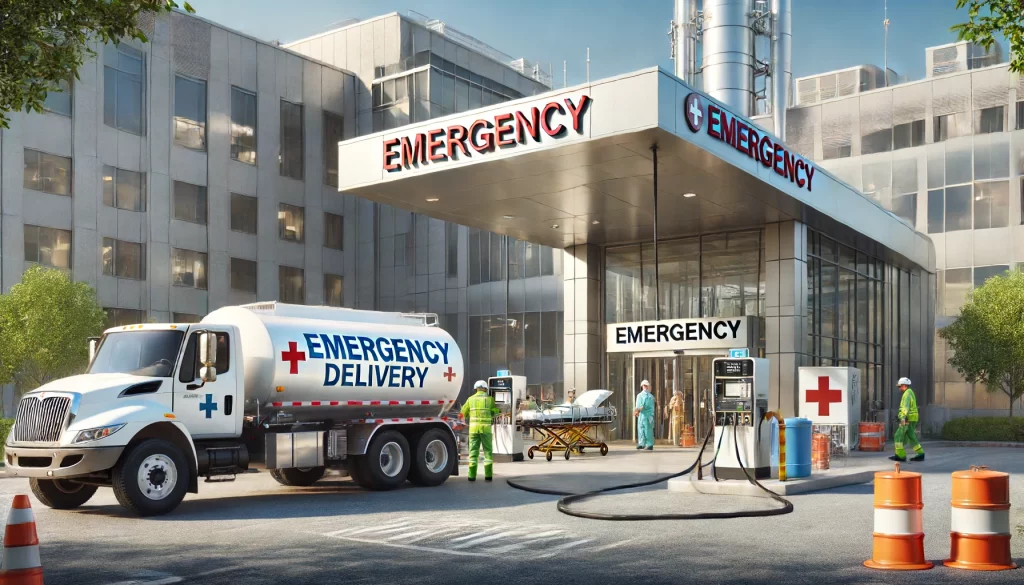The Vital Role of Hospitals and the Need for Uninterrupted Power
Hospitals play a critical role in providing 24/7 care to the community, ensuring the health and safety of patients through continuous medical services. The functionality of these facilities is integral to public health, particularly in emergency situations where time and reliability can mean the difference between life and death. In these critical environments, any disruption due to power outages or fuel shortages can drastically affect patient care, making reliability and preparedness crucial factors.
Emergency fuel delivery services are essential in such scenarios, providing a rapid response to prevent or resolve fuel deficits that could impair hospital operations. These services ensure that hospitals can sustain vital operations without interruption, exemplifying the crucial nature of preparedness in healthcare. Hospitals, thus, must prioritize robust emergency fuel strategies to safeguard against potential energy crises effectively.
Why Hospitals Need Emergency Fuel Delivery
Powering Life-Saving Equipment
For hospitals, the ability to maintain power during an outage is not just a convenience; it’s a necessity for life-saving care. Emergency generators rely on a steady supply of fuel to keep critical equipment running smoothly, including ventilators, dialysis machines, and surgical instruments. These generators are the backbone of a hospital’s emergency response system, ensuring that patient care continues without a hitch during power interruptions.
The presence of a reliable fuel delivery service bolsters hospital resilience, enabling uninterrupted operation of life-supporting machinery that countless patients depend on each day. In these circumstances, the speed and reliability of fuel delivery can directly impact the quality of care and patient outcomes during emergencies. Timely and efficient emergency fuel delivery can therefore be seen as a critical component of healthcare infrastructure, particularly in areas prone to power issues.
Maintaining Operations
Beyond just medical equipment, hospitals require power for virtually all aspects of their operations. Emergency fuel delivery ensures that backup generators can sustain essential systems such as lighting, communication networks, and heating/cooling systems, which are crucial for maintaining a safe and functional environment during a power outage. Additionally, it is vital to keep staff facilities like showers and toilets running efficiently, as the well-being of the medical staff is essential for effective patient care during extended emergencies.
Ensuring these facilities remain operational helps maintain morale and operational effectiveness, providing staff with the support they need to perform under pressure. Consistent fuel supply also ensures that non-medical yet critical systems, such as data centers and security systems, continue to function, further supporting the hospital’s overall operational integrity during emergencies.
Transportation and Logistics
Hospitals also depend on fuel for more than just electricity. Emergency vehicles such as ambulances are vital for transporting patients and must remain operational at all times. Similarly, fuel is needed for ensuring that deliveries of medical supplies are uninterrupted, which is crucial for maintaining stock levels of necessary medical and sanitary products. Emergency fuel delivery services guarantee that these critical aspects of hospital logistics are not compromised, providing peace of mind and continuity in services during critical times.
This aspect of emergency preparedness is often overlooked, yet it is just as crucial in ensuring that hospitals can meet the demands of a crisis efficiently and effectively. Adequate fuel supply is essential not only for ambulances and in-house transportation vehicles but also for external logistical support that might be required to maneuver through a crisis
The Importance of Reliable Emergency Fuel Partnerships
Considering the critical dependence of hospitals on continuous power and operational logistics, partnering with a reputable emergency fuel delivery service is not just beneficial but essential. Such partnerships ensure that hospitals can focus on their primary mission of saving lives without the added concern of fuel supply issues. Hospitals are encouraged to establish strong relationships with trusted emergency fuel providers like Fuel Me, which specialize in rapid, reliable service to meet emergency needs.
With the right support, hospitals can enhance their resilience against power disruptions, ensuring they are always ready to deliver critical care, no matter the circumstances. These strategic partnerships not only fortify hospitals against unforeseen challenges but also bolster community trust in the healthcare system’s capacity to function effectively even in the face of adversity.














































